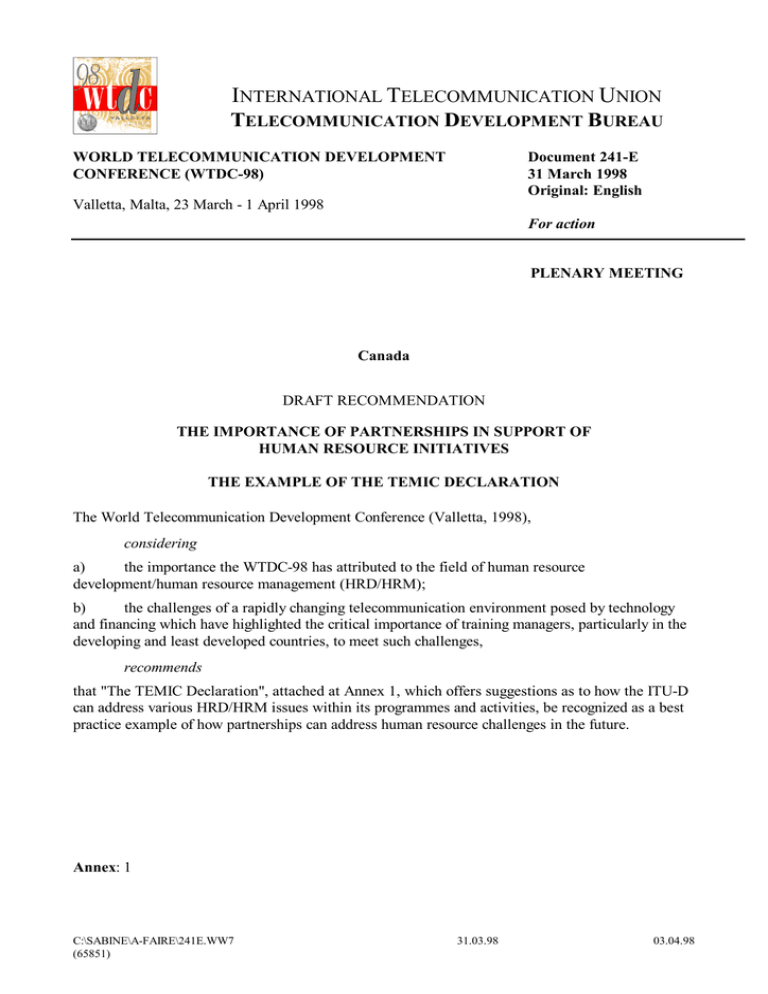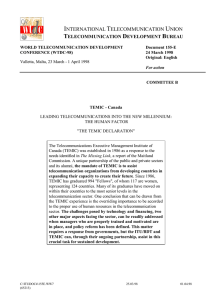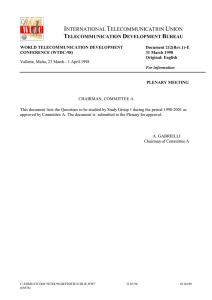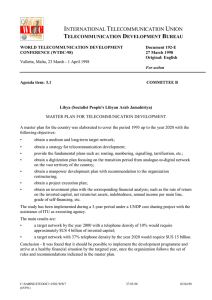I T U D
advertisement

I NTERNATIONAL TELECOMMUNICATION UNION TELECOMMUNICATION DEVELOPMENT BUREAU Document 241-E 31 March 1998 Original: English WORLD TELECOMMUNICATION DEVELOPMENT CONFERENCE (WTDC-98) Valletta, Malta, 23 March - 1 April 1998 For action PLENARY MEETING Canada DRAFT RECOMMENDATION THE IMPORTANCE OF PARTNERSHIPS IN SUPPORT OF HUMAN RESOURCE INITIATIVES THE EXAMPLE OF THE TEMIC DECLARATION The World Telecommunication Development Conference (Valletta, 1998), considering a) the importance the WTDC-98 has attributed to the field of human resource development/human resource management (HRD/HRM); b) the challenges of a rapidly changing telecommunication environment posed by technology and financing which have highlighted the critical importance of training managers, particularly in the developing and least developed countries, to meet such challenges, recommends that "The TEMIC Declaration", attached at Annex 1, which offers suggestions as to how the ITU-D can address various HRD/HRM issues within its programmes and activities, be recognized as a best practice example of how partnerships can address human resource challenges in the future. Annex: 1 C:\SABINE\A-FAIRE\241E.WW7 (65851) 31.03.98 03.04.98 -2CMDT98/241-E ANNEX "The TEMIC Declaration" The Telecommunications Executive Management Institute of Canada (TEMIC) was established in 1986 as a response to the needs identified in The Missing Link, a report of the Maitland Commission. A unique partnership of the public and private sectors and its alumni, the mandate of TEMIC is to assist telecommunication organizations from developing countries in expanding their capacity to create their future. Since 1986, TEMIC has graduated 994 "Fellows", of whom 117 are women, representing 124 countries. Many of its graduates have moved on within their countries to the most senior levels in the telecommunication sector. One conclusion that can be drawn from the TEMIC experience is the overriding importance to be accorded to the proper use of human resources in the telecommunication sector. The challenges posed by technology and financing, two other major aspects facing the sector, can be readily addressed when managers who are properly trained and motivated are in place, and policy reform has been defined. This matter requires a response from governments, but the ITU/BDT and TEMIC can, through their ongoing partnership, assist in this crucial task for sustained development. In the course of its programme, TEMIC has been made aware of certain preoccupations of developing countries. They are concerned, for example, with the process of sector reform; with the need to build the case for change in their country; with the broader impact of reform on employment policy, and with the need for a greater awareness of the role of telecommunications in a nation's transition to the information society. Some of these preoccupations, such as universal access, the use of new and existing technologies, can be addressed by the telecommunications sector. Others must be addressed by other sectors, such as education, health and small and medium enterprises, where cross-sectoral collaboration is required. Education is only partly a telecommunication matter. The will to undertake sector reform must come from the highest levels of government, and must come from within a country. Reform could well be initiated through commitments proposed to liberalize telecommunications under the WTO/GATS with respect to basic telecommunication services. The Development Sector of the ITU may wish to keep these preoccupations in mind and use its catalytic role to help address these preoccupations. For example, the ITU-D can: • emphasize, in its training programmes (both traditional and advanced), the need for executives and managers, from both the public and private sectors, to learn the skills to manage in an entrepreneurial and competitive environment; C:\SABINE\A-FAIRE\241E.WW7 (65851) 31.03.98 03.04.98 -3CMDT98/241-E • when assisting developing countries in the preparation of their transitional plans for reform, to continue to stress with vigour the need for these countries to follow best practices if they are to achieve success. Similar advice should also be given to countries which choose to develop WTO/GATS commitments in telecommunications services; • identify and promote ways in which telecommunication systems can be exploited to enhance the contribution that education can make to bring about the changes in management style, including gender issues, which are crucial if broad development is to be achieved; • encourage ITU members and other telecommunication entities to stimulate partnerships between the public and private sectors, and within the private sector, so that the process of reform produces the maximum positive effects while the negative effects are eliminated, or at least reduced; • consider the creation of an advisory committee on human resource development matters, as related to new technology, new services and related matters as identified in this paper, etc. TEMIC strongly believes that these steps will address the new gaps, and in particular assist in the modification of the operating style in both the private and public telecommunication sectors. In this way, the ITU would be addressing the human resource challenges which TEMIC perceives and which are posed in the opening paragraph of this contribution. TEMIC and its alumni look forward, as a key partner, to continue to support the ITU in this endeavour. C:\SABINE\A-FAIRE\241E.WW7 (65851) 31.03.98 03.04.98



